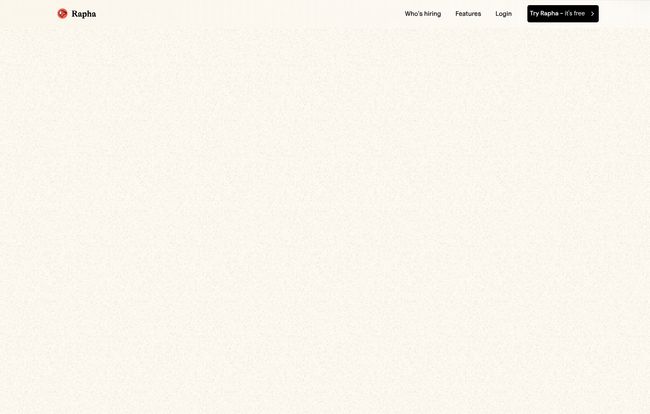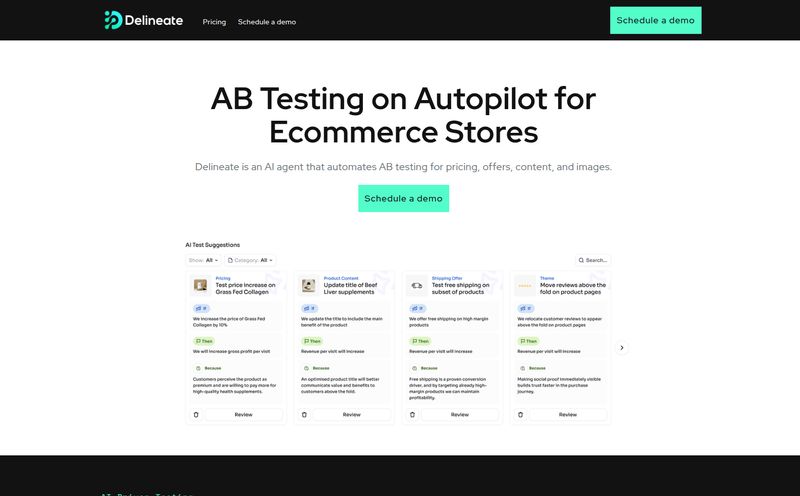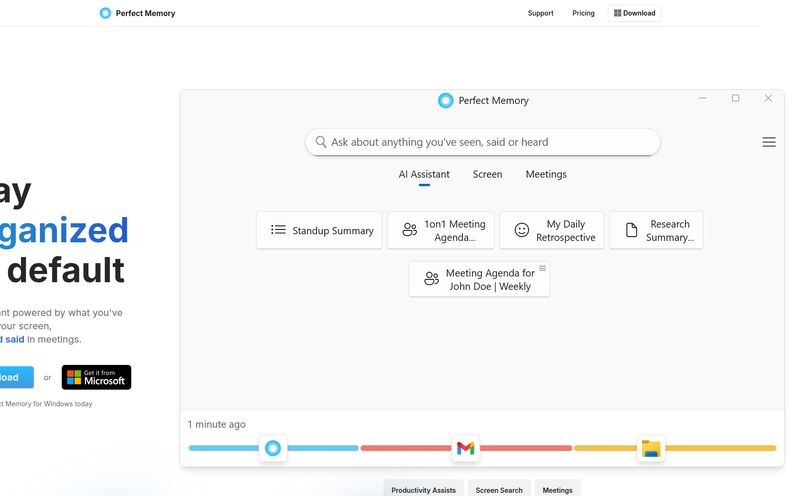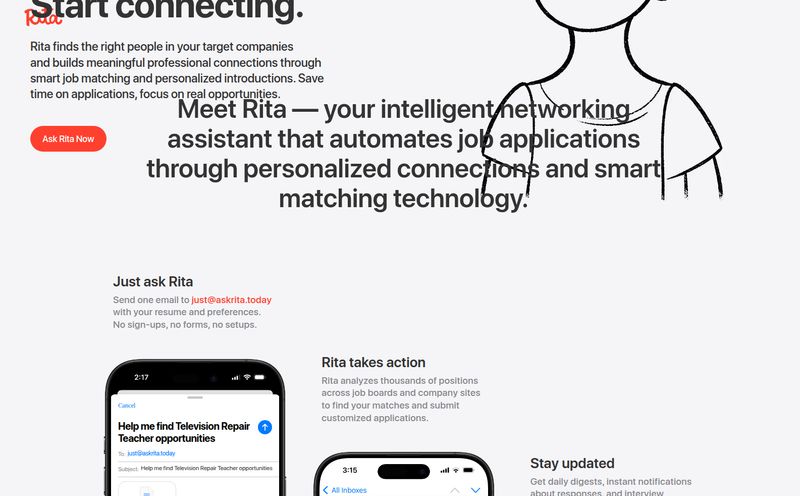If you’ve spent any time in recruiting or hiring, you know the drill. You post a job, get a flood of resumes, and then begins the soul-crushing task of the initial phone screen. It's a logistical nightmare of scheduling, no-shows, and stilted 15-minute conversations that rarely tell you what you really need to know.
I've been in the traffic generation game for years, and I can tell you that a clunky, impersonal application process is one of the fastest ways to lose great talent at the top of the funnel. It's a leaky bucket. We spend so much time and money on employer branding and outreach, only to force candidates through a gauntlet that feels like it was designed in 1998.
So, when a tool comes along that doesn't just promise to digitize the old way but to fundamentally change the interaction, my ears perk up. That's what happened when I came across Rapha. Their pitch isn't about better resume parsing or fancier dashboards. It's about bringing the human voice back to the forefront of hiring. And it's a fascinating idea.
What Exactly is Rapha? (And Why Should You Care?)
At its core, Rapha is an Applicant Tracking System (ATS) with a killer twist. Instead of the initial phone screen, it asks candidates to answer a few questions using their voice. They just record their responses, and you get to listen to them on your own time. No scheduling, no phone tag, no awkward small talk.
But it's more than just a fancy answering machine. Rapha uses AI to help you through the process—from suggesting the right questions to ask, to helping you shortlist the applicants who sound most promising. Their tagline is, “Let’s capture origin stories together,” and I kind of love that. It reframes the goal from “screening candidates” to actually hearing their story. A resume is the sheet music, but the audio response? That's the performance.

Visit Rapha
This approach aims to get a signal on two crucial fronts early on: the hard skills, sure, but also that ever-elusive “culture fit.” You can hear a person's enthusiasm, their communication style, and the way they think on their feet in a way that a bulleted list of past job duties just can't convey.
The Sound of a Better Candidate Experience
I’m always looking at trends, and one of the biggest shifts in the last few years is the focus on candidate experience. Companies are finally realizing that every applicant is a potential customer or brand ambassador. A bad hiring experience can do real damage.
Ditching the Dreaded Phone Screen
For recruiters and hiring managers, the time savings are obvious. Think about the hours spent every week just coordinating schedules. With Rapha, you send out the request, and the responses roll in. It gives you back the time to focus on what actually matters: engaging with your top contenders. For candidates, it means they can apply when it’s convenient for them, without having to find a quiet corner of their office for a clandestine call.
More Than Just Words on a Page
This is the real meat of it for me. I’ve seen countless perfect-on-paper candidates who just didn't have the right energy or communication skills for a role. An audio clip can reveal so much. You can hear confidence, clarity, and personality. It adds a whole new dimension to an application, turning a flat, two-dimensional file into something much more human and engaging. It’s the difference between reading a movie poster and watching the trailer.
The AI Assistant in Your Recruiting Corner
Now, the term “AI in recruiting” can be a little scary. It brings up images of cold, unfeeling robots making decisions. But that's not what's happening here. Rapha’s AI feels more like a helpful assistant, designed to augment your own judgment, not replace it.
For instance, it can help you write a better job description or recommend audio questions that are proven to get insightful responses. Once the applications come in, its AI can help you shortlist candidates, flagging those whose answers align best with what you're looking for. It’s a smart tool to cut through the noise, but at the end of teh day, you still make the call.
A Look at the Core Features
Beyond the headline audio feature, Rapha is a surprisingly complete platform, especially for startups, agencies, and companies with distributed teams.
- Centralized Activity Tracking: You get one place to see every interaction with every candidate, which is crucial for keeping a growing team on the same page.
- Built-in CRM: This is great for nurturing talent pools. You can keep track of silver-medalist candidates for future roles without needing a separate system.
- Global Hiring Support: The platform is built for remote work, supporting multiple languages and making it easier to hire the best talent, no matter where they are.
These features show they're thinking about the whole recruiting lifecycle, not just that one initial screening step.
The Elephant in the Room: Potential Downsides and Biases
No tool is perfect, and it would be dishonest not to talk about the potential snags. I’ve always felt that you have to go into new tech with your eyes wide open.
The Tech Hurdle
First, there's the simple requirement that a candidate has access to decent recording equipment and a quiet place to record. While most people have a smartphone with a mic, the quality can vary. Is it fair to judge someone based on a recording that has a dog barking in the background? It’s something hiring teams need to be mindful of.
The Bias Question
This is the big one. The recruiting world is rightly having a massive conversation about unconscious bias. Some might argue that hearing someone's voice could introduce new biases based on accent, gender, or speaking style. It’s a valid concern. My take is that this is where training and process become critical. If you use the audio response as just one data point among many—alongside their resume, portfolio, and a structured interview process—you can mitigate some of that risk. The bias exists in a phone call too; at least here, you can have multiple people on the team review the same recording to get different perspectives.
Is It Right for Every Role?
Probably not. For a customer support, sales, or podcasting role where vocal communication is the job, this is a home run. For a senior backend developer who spends 95% of their time writing code? Maybe their GitHub profile is a much better indicator of success. It's about using the right tool for the right job.
What’s the Catch? The Rapha Pricing Model
So, how much does all this cost? Here’s the interesting part. Right now, the button on their website says, “Try Rapha – it’s free.”
This could mean a few things. It might be in a free beta period to gather users and feedback. It could be a freemium model, where the core features are free and you pay for advanced capabilities. Or it could be a limited-time offer. Whatever the case, “free” is a pretty compelling price point to test out a new way of hiring. My advice is to jump on it while you can and see if it works for your team.
My Final Take as an SEO and Traffic Pro
From my perspective, a tool like Rapha isn't just about efficiency. It's about brand and attraction. A modern, human-centric application process becomes a selling point. It tells candidates that you're a forward-thinking company that values their time and their story. That's the kind of employer branding that money can't buy, and it directly impacts the quality and quantity of talent you attract. It lowers your cost-per-hire and builds a stronger, more engaged talent pipeline for the future. It’s a trend that’s here to stay.
Frequently Asked Questions
- 1. How does Rapha's AI actually work with the audio responses?
- The AI primarily helps in two ways: it recommends effective questions to ask and then assists in shortlisting candidates by analyzing the content and context of their answers against your job requirements. It's designed to flag promising candidates for human review, not make the decision for you.
- 2. Is Rapha a full replacement for an ATS like Greenhouse or Lever?
- For smaller companies, startups, or agencies, Rapha can absolutely function as a primary ATS, since it includes a CRM and activity tracking. Larger enterprises might use it as a specialized tool to enhance the top of their funnel, integrating it with their existing, more complex HR systems.
- 3. Can candidates re-record their answers if they mess up?
- Yes, typically platforms like this allow candidates one or two chances to re-record their answers. This takes some of the pressure off and allows them to put their best foot forward, which is a key part of a positive candidate experience.
- 4. What languages does Rapha support for global hiring?
- The platform is designed with global and distributed teams in mind and supports multiple languages. This is a huge plus for companies looking to hire talent from around the world without language being a barrier in the application tool itself.
- 5. How does Rapha handle candidate data privacy?
- Like any reputable hiring platform, Rapha is expected to adhere to data privacy regulations like GDPR and CCPA. Candidate data is handled securely, and the platform provides tools for managing and deleting data according to legal requirements.
Conclusion
In a world of automated resume scanners and impersonal application forms, Rapha is a breath of fresh air. It’s a bold attempt to re-inject a bit of humanity into the very beginning of the hiring process. It's not a silver bullet, and it comes with its own set of considerations—especially around bias—that teams must navigate thoughtfully. But the potential to save time, get a richer picture of candidates, and improve the overall experience is undeniable. Given that you can try it for free, it seems like a no-brainer for any company tired of the phone screen shuffle. It might just be time to let your candidates be heard.
Reference and Sources
For more information, visit the official platform website at rapha.ai.
For further reading on the complexities of AI in recruitment, I recommend articles from sources like the Harvard Business Review that discuss both the potential and the pitfalls.



